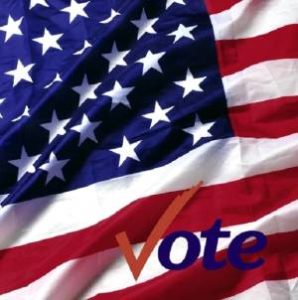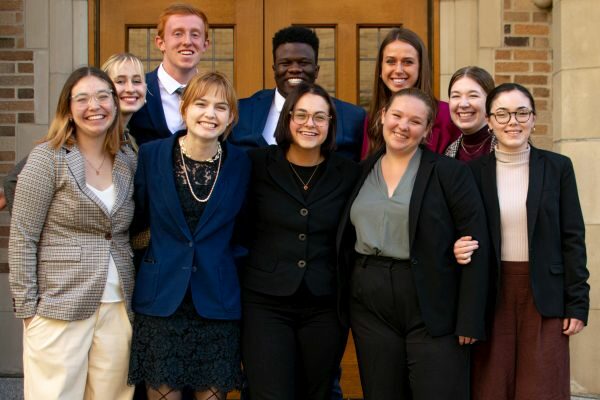
As the November 3rd elections continue to get closer, we asked members of the department a very simple question. Why vote? Here are our answers in 200 words or less.
Bill Blomquist
I vote (and recommend that others do so too) for a few reasons.
First, elections really matter. No matter your philosophy or party, you can probably think of an election in the recent past that was won by someone you thought did a horrible job. Think about what a difference it would have made if that person had not been elected.
Second, strategically, it’s highly unlikely that your vote will decide the outcome of an election, but it’s fairly certain that your vote neutralizes/cancels out the vote of someone else who voted the other way. You can’t guarantee that your vote decides the outcome but you can guarantee that their vote won’t.
Third, pragmatically, if you vote regularly you keep your registration in effect for as long as you stay at your current address. Voting, even in elections you may not care about very much, will make your life easier when an election comes around in which you really do want to vote.
Tijen Demirel-Pegg
I lived in the United State as a legal immigrant for 18 years. While I had almost all the rights and privileges of a US citizen, I could not vote. As someone who is keenly aware of her political environment, my inability to contribute to the democratic process bothered me. I wanted to have a voice here. For several years, until Turkey allowed absentee voting, I was unable to vote either in my home country where I did not live anymore, nor in my adopted country where I was not yet a citizen. So, I became a US citizen in 2019 after ironing out the bureaucratic complications due to my German and Turkish citizenships. Now, my voice counts here, too. From my work on civil resistance campaigns in authoritarian countries, I study and teach how people risk their lives to have their voices heard. I write about those who get beaten up, tortured, or even killed because they want to be able to vote. I see voting as a privilege that is granted to citizens of democratic countries; a privilege that enables me to hold those in power accountable. That’s why I vote.
Aaron Dusso
When I teach Intro to American Politics my favorite day is the day I get to come to class and say voting is irrational! The looks on the faces of my students upon hearing such heresy is priceless. Of course, this is based on the classic economic perspective of voting that focuses on costs vs. benefits. That is, the probability that my one vote is going to change the outcome of the election is vanishingly small. Thus, the costs are always higher and the act of voting is irrational. It’s a thought-provoking exercise.
What this perspective misses are the real reasons we vote i.e., the solidary and expressive benefits tied together with a healthy dose of habit. So, why should you or I vote? Sure, you can do it out of a sense of community responsibility, social obligation, or simply out of habit. But why you should really go vote is to express your sublime support or utter and complete contempt with what is going on right now. There are few opportunities for each of us to express our thoughts and feelings so directly with a single act. To pass this one up would be folly.
Amanda Friesen
Get involved in local politics and elections! State legislatures, city councils, county commissions, and school boards make decisions that impact nearly every aspect of your life. And yet, Americans know very little about their local and state officials and are less likely to turn out to vote for these elections when it isn’t a presidential election year. Are you passionate about the environment? Support local and state candidates who will effect change in our cities and states. Are you concerned about policing and criminal justice? Vote for city council members, sheriffs, judges, attorneys who support your views – or are closer than the other candidate. Do you think our public schools could be improved? Pay attention to who is running for your local school board and their plans for the district. As you look around at the candidate landscape and you think there are voices not being heard, run for office or encourage someone else and work on their campaign! Local and state offices are a great place to start political movements and careers.
John McCormick
We each need to vote because we live in a representative democracy, and if we don’t make ourselves heard then government will not pay attention to our interests and concerns. One person choosing not to vote will not make much difference, but if hundreds or thousands of people make the same choice, then whole blocks of society will not be heard. The problem becomes more obvious when we think about those who are less likely to vote: people with lower incomes, people with less education, ethnic minorities, and people in the 18-29 age group. By contrast, people who are wealthier, better educated, white and older are more likely to vote, which is partly why government looks like them and takes care of their interests first. If you don’t mind having your representatives chosen by others, and don’t mind not having your voice heard, then by all means don’t vote. But if you want government to hear you, then casting a vote is essential.
Scott Pegg
I vote because I am conscious of the privilege that has been bestowed upon me. As a white male US citizen, my right to vote has been secure for centuries. Yet, as we mourn the recent passing of civil rights icon and voting rights activist John Lewis and we approach the 100th anniversary of the passage of the 19th Amendment granting women the right to vote, I am well aware that others in this country have not been so fortunate. Even today, here in Indiana, we have challenging voter ID laws that suppress voter turnout. Globally, Freedom House has now recorded 14 consecutive years of democratic decline. I have been inspired by Nigerian activists I know who went to prison and were tortured for fighting to end a dictatorship and demand their right to vote. I have been inspired by seeing hundreds of women lined up to vote for hours before the polls opened in Somaliland’s last presidential election. I am inspired by the courage of protesters in Hong Kong, Iran, Sudan, and other such places putting their lives at risk for a democratic future that I was lucky enough to be born into. I vote for them.
Scott Wallace
At a time when so many roadblocks are being thrown up to make voting harder, I think a question worth asking is this: Why does someone, anyone, want you to NOT vote? If you choose to not vote, if you fail to navigate the obstacles, who benefits and to what effect? What is gained for those who wanted you barred from the most fundamental of democratic processes? We see so many efforts to show that government cannot be effective or that politics is hopelessly bogged down or corrupt, all of which discourage our participation. But just as your participation directly benefits the candidates and values that you support, a similar lack of participation is directly to the detriment of those same values. So, put in the work to support democracy. It’s a special but fragile thing and the most basic guard we have against its degradation is the right to vote.









